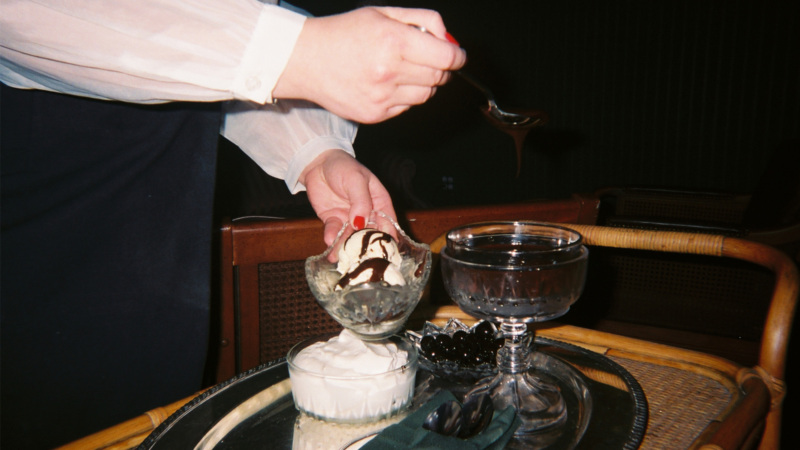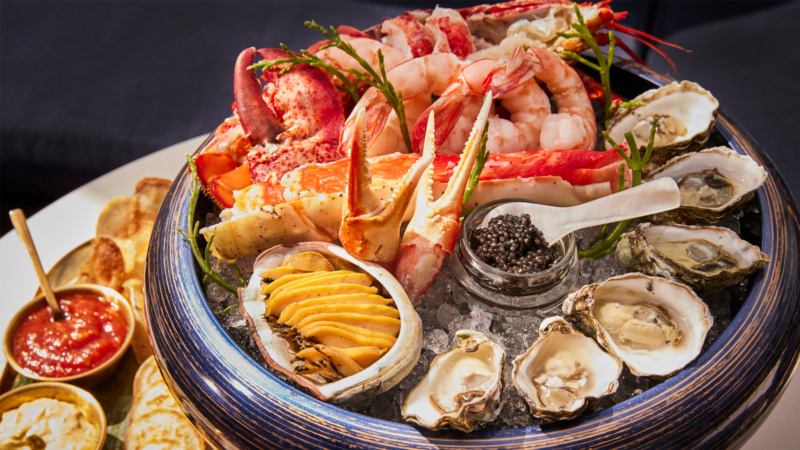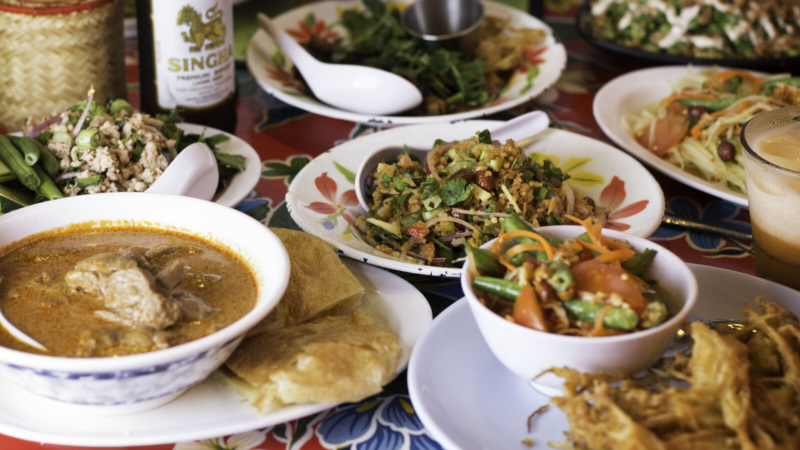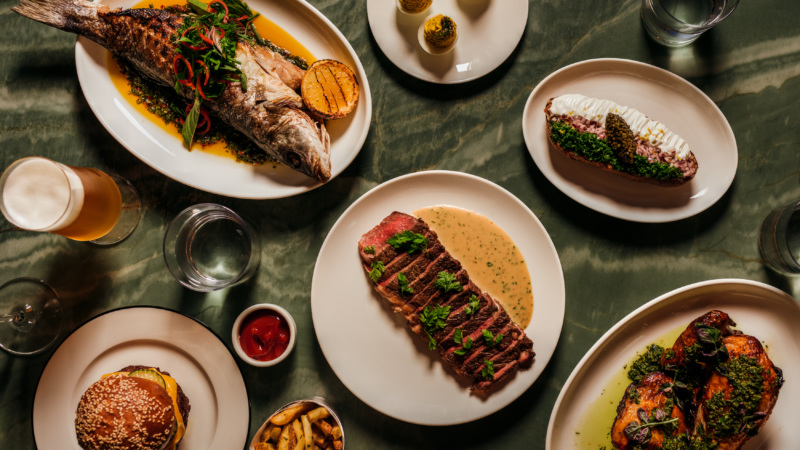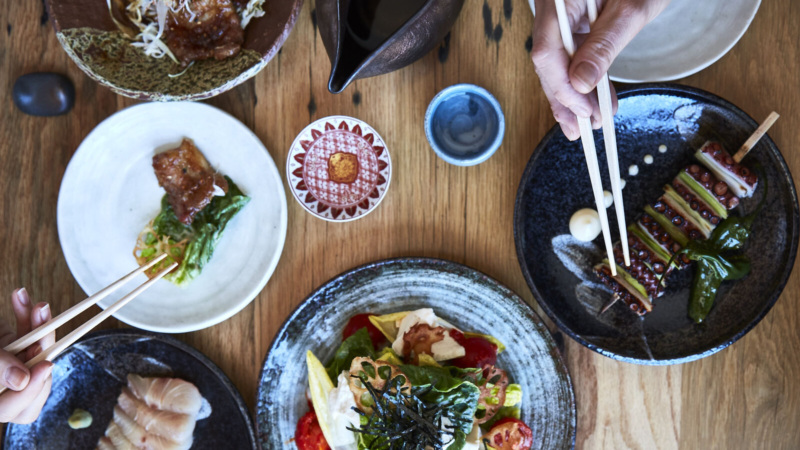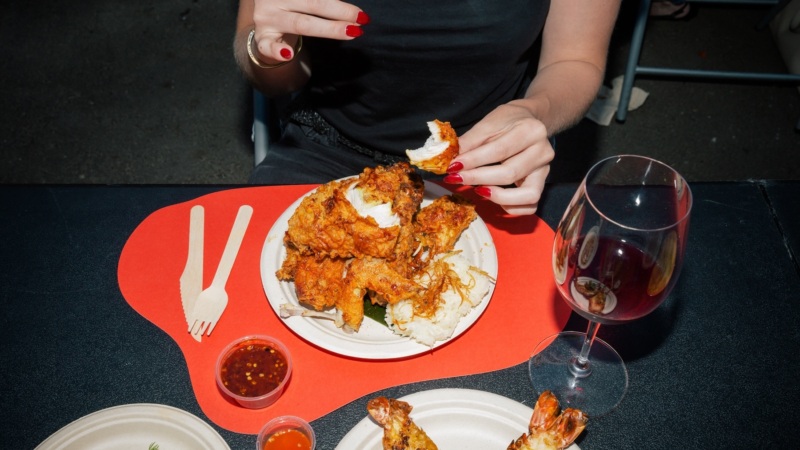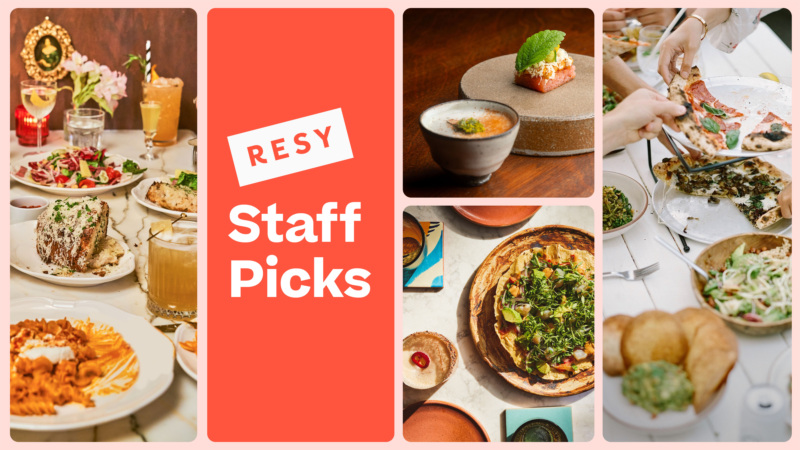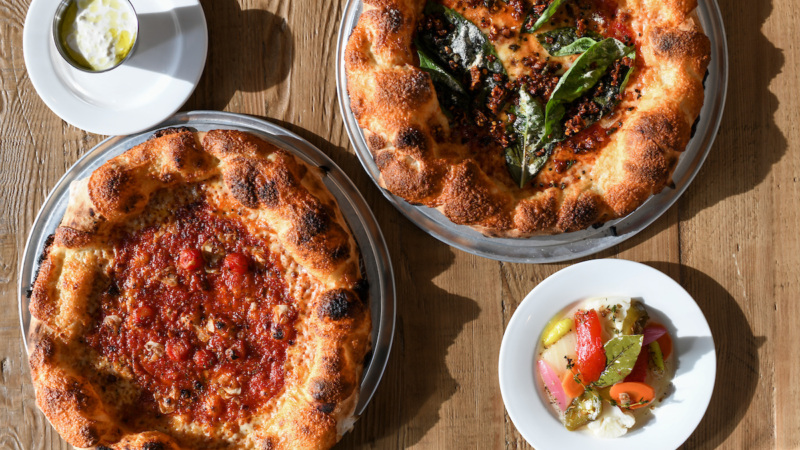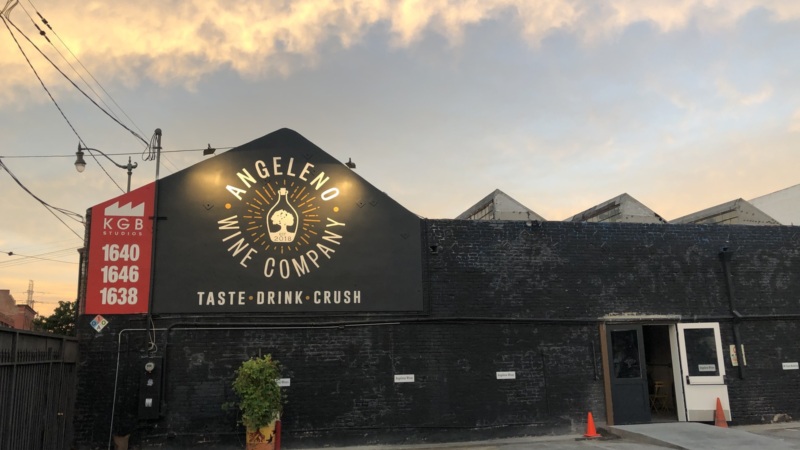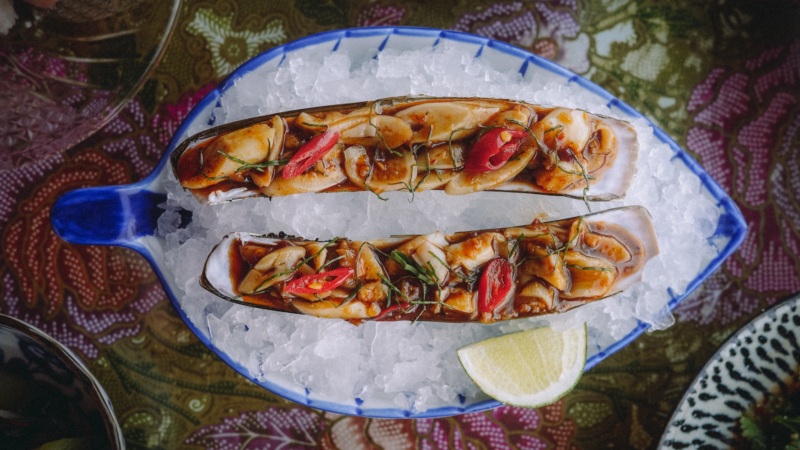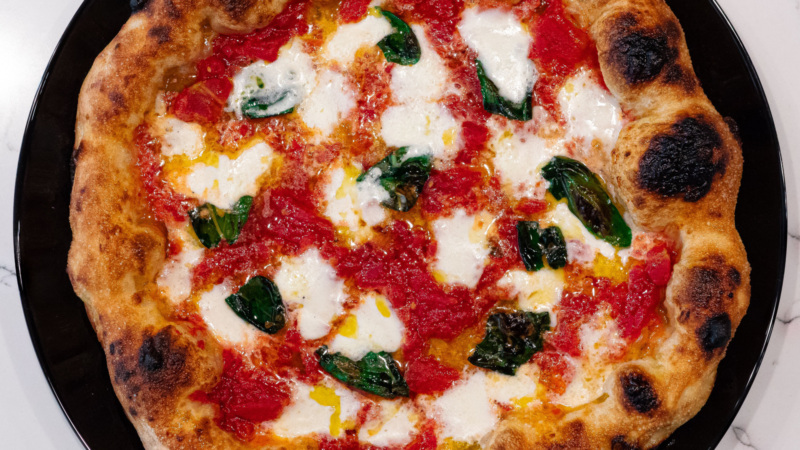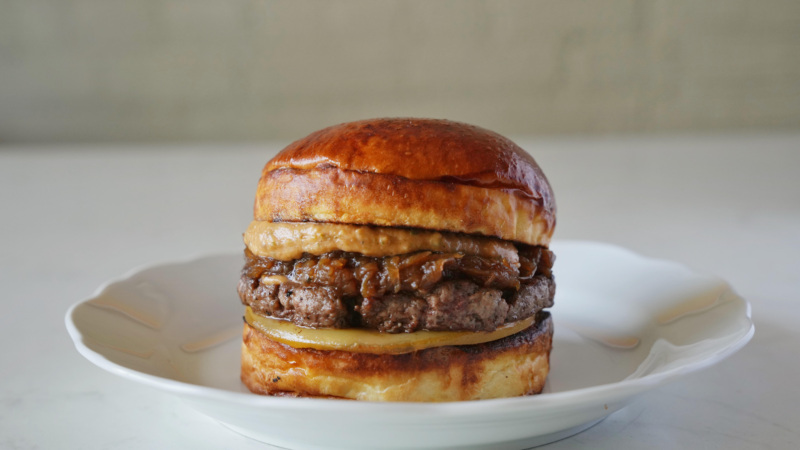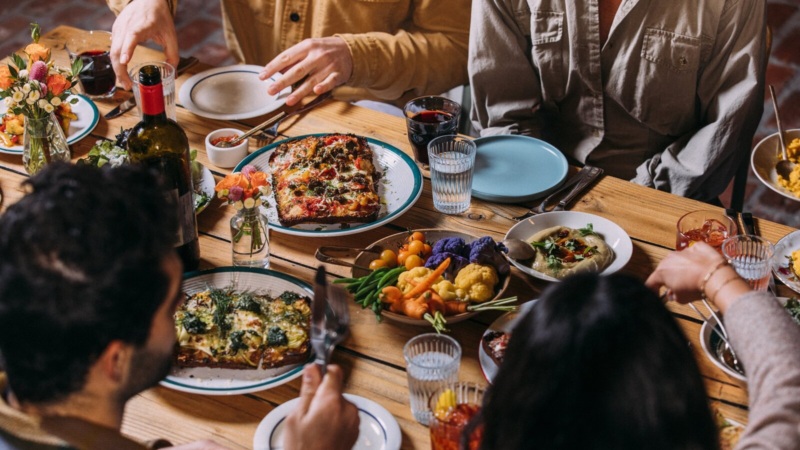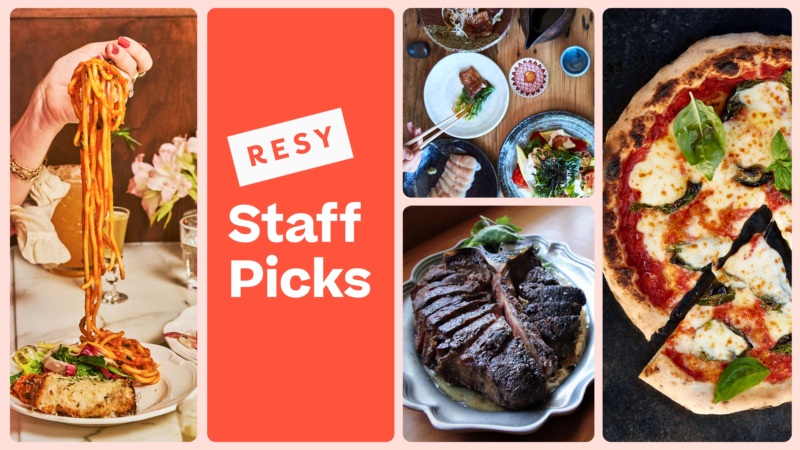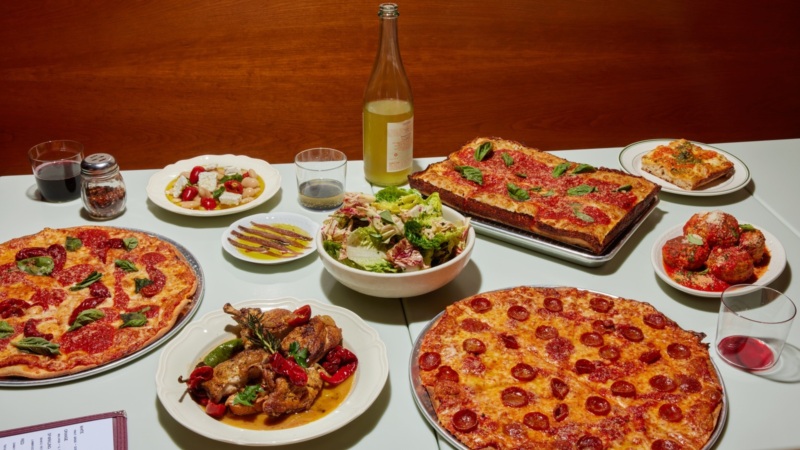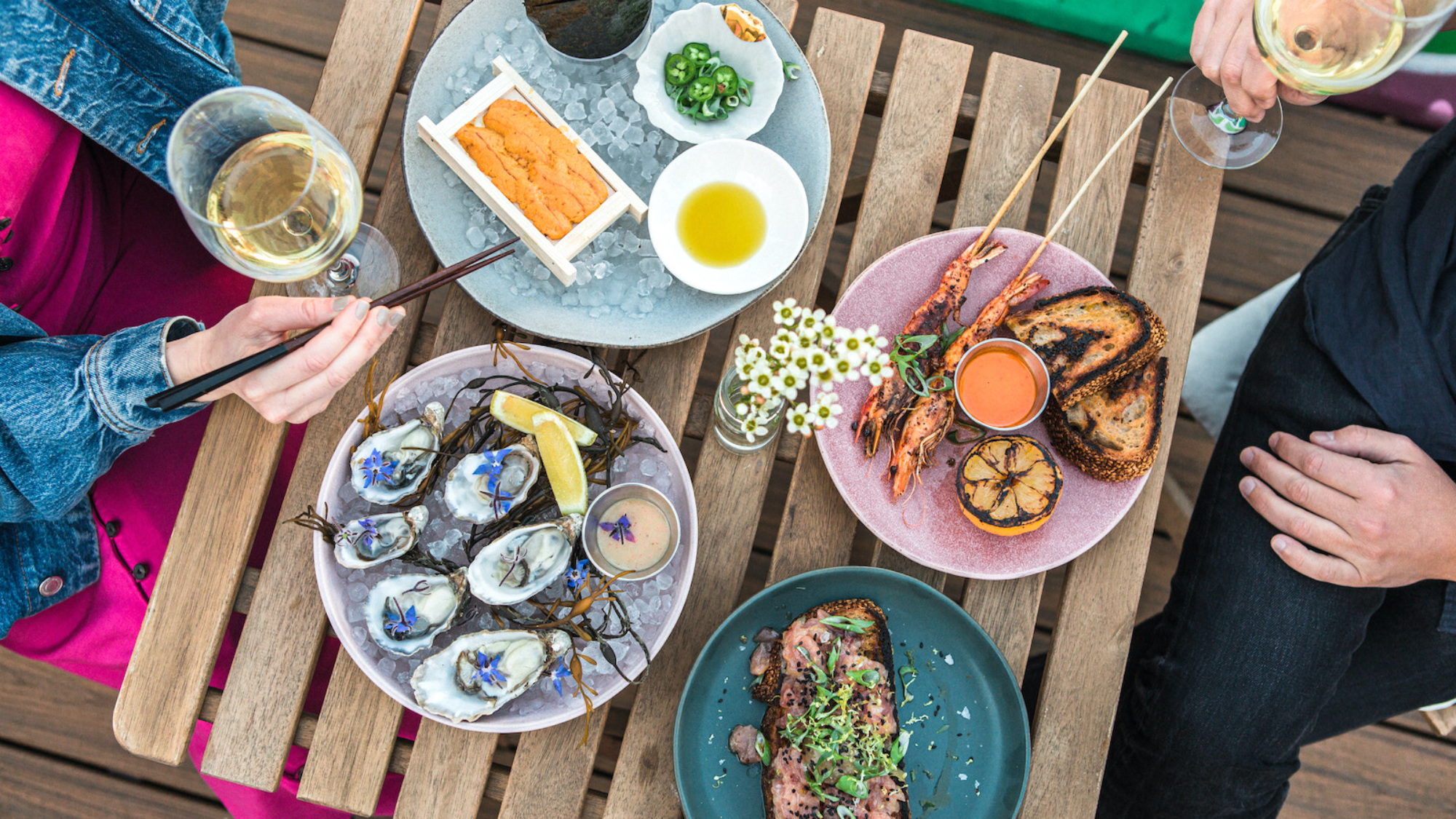
The Owners of Crudo e Nudo Believe Now Is the Time to Transform Restaurants
If there’s one thing the pandemic has afforded some people, it’s a chance to start over, reinvent themselves or their business. To do something new, and look to the future with an optimistic eye that everything can be better. We see that more than ever in restaurants right now, and what chef Brian Bornemann and partner Leena Culhane are doing with Crudo e Nudo is a prime example.
Part coffeeshop, marketplace, seafood market, and (soon) oyster bar, the small Santa Monica concept grew out of their roving popup that featured, not surprisingly, crudo and other fresh, seasonal raw fish dishes. They started early in the pandemic in 2020, taking the show around the city, from West Hollywood to Echo Park to Santa Monica. Two long stretches were at Fig Tree Cafe in Venice, and Shutters on the Beach, where sunshine and blue skies provided the perfect backdrop for things like chickpea crepes filled with smoked salmon and ikura, and striped bass sashimi with bottarga and fried capers.
A year later, the duo has finally debuted a brick-and-mortar location along busy Main Street, not far from the beach. The location fits their lifestyle: The two are Santa Monica through and through, both having lived on the Westside for years (Bornemann was born there); they love the water, they surf, they frequent the farmers markets. And even though they lived in the same dorm at UCLA more than 10 years ago — on the same floor, no less — they didn’t meet until last year.
It seems Bornemann, a chef who was part of the contemporary revival of Michael’s as its executive chef just before COVID, and worked at the Tasting Kitchen, and Culhane, an interdisciplinary artist with years of hospitality experience, were destined to be within each other’s orbit.
Pulling from their own lives and experiences, they set out to create the kind of business they always wished they could work for: A restaurant that promotes sustainability, and regenerative and equitable practices, including equal pay, via the products they use and sell, the people they partner with, and the staff they hire. They employ local and seasonal produce and seafood, and endeavor to be as waste-free as possible, from utilizing a whole snapper to repurposing herbs grown onsite. Charity is also key — Culhane, who oversees the daytime concept Lenny’s Coffee, plans to donate proceeds from her morning sales to nonprofits that combat food insecurity and support environmentalism.
They understand these seem like lofty goals, but as the world moves out of pandemic restrictions, this is as good a time as any to forge new paths and find ways to make things better and brighter, especially in the restaurant industry.
Resy: What can you tell us about building this concept in Santa Monica?
Brian Bornemann: We realized we needed a permanent space to cultivate our own clientele, to build a space so we could control the way waste leaves and how product comes in — and the way people come in and out of the space, especially during the pandemic. But it’s also about building a traceable seafood restaurant experience, something sustainable for the long run.
Leena Culhane: I think living by the beach, being surfers, and being people that are really affected by our environment, we have a similar ethos when it comes to sustainability. So we want to do something where people can experience delicious food, but where it’s also regenerative — from the fisherman we’re working with, who are making the oceans better in their practices, to the winemakers and local artisans we’re featuring in the shop. I firmly believe the rising tide floats all boats.
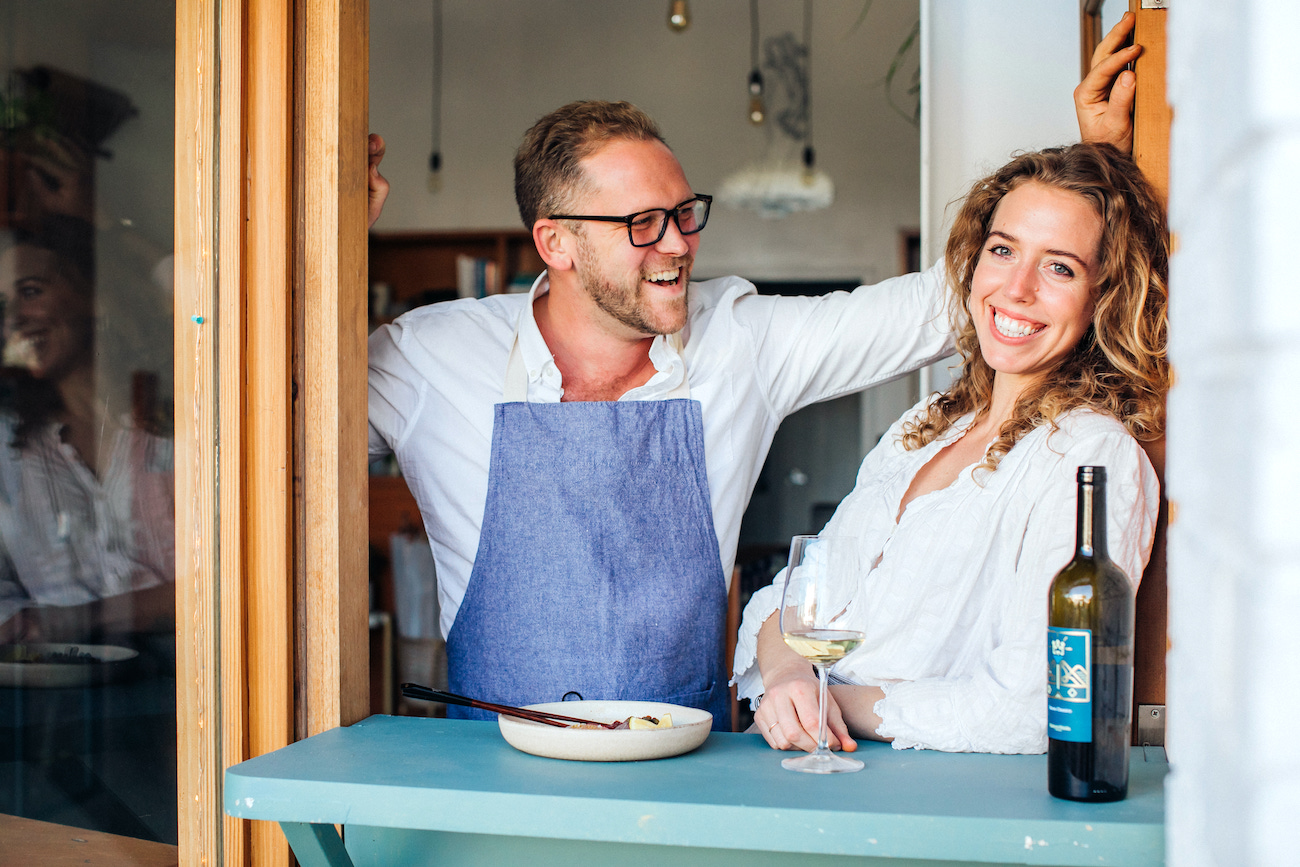
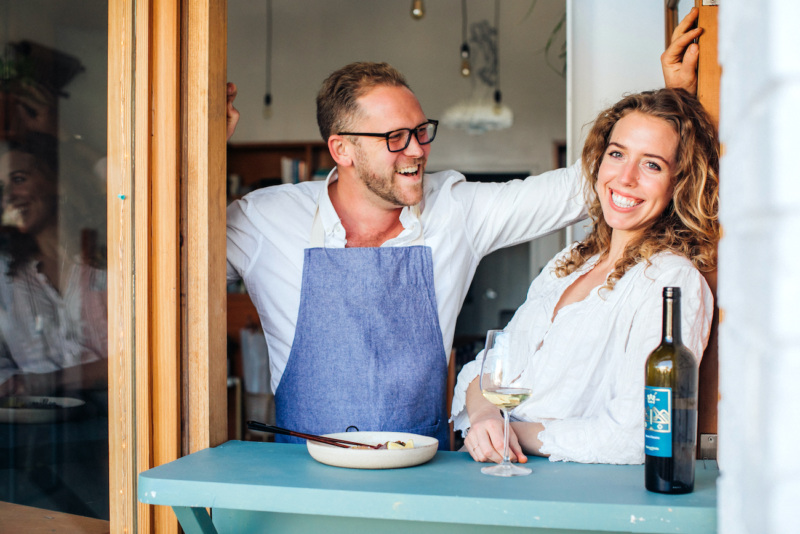
When you dreamed of one day opening your own restaurant, did you think it would start this way?
Bornemann: I always wanted to open a restaurant and create my own space, yeah. I had been thinking about it for years in abstract terms, but it was made a lot more real over the past year. And I thought about the market side for some time, too. So when the pandemic hit, it finally allowed the freedom to think outside of the box.
And that’s how the popup came to be?
Bornemann: I knew that with the popup raw bar, and a focus on crudo, we could do a lot with a minimal amount of people. We were always trying to work outside during the pandemic, so that we’re not cross-contaminating with other people and their staff. So we were looking at opportunities where we got to be outside and serve delicious food, where it’s a visual experience and stimulating for the guests, but also safe for us.
Couldn’t have been easy trying to keep a bunch of seafood cold during hot days.
Bornemann: You invest in some really good coolers, and you’d be amazed how well they function. We specifically came up with a low-bar concept because of that flexibility of not needing a hood and not needing a kitchen. So when we were doing some of the popups initially last summer, we were able to provide a draw for places that didn’t even have a kitchen.
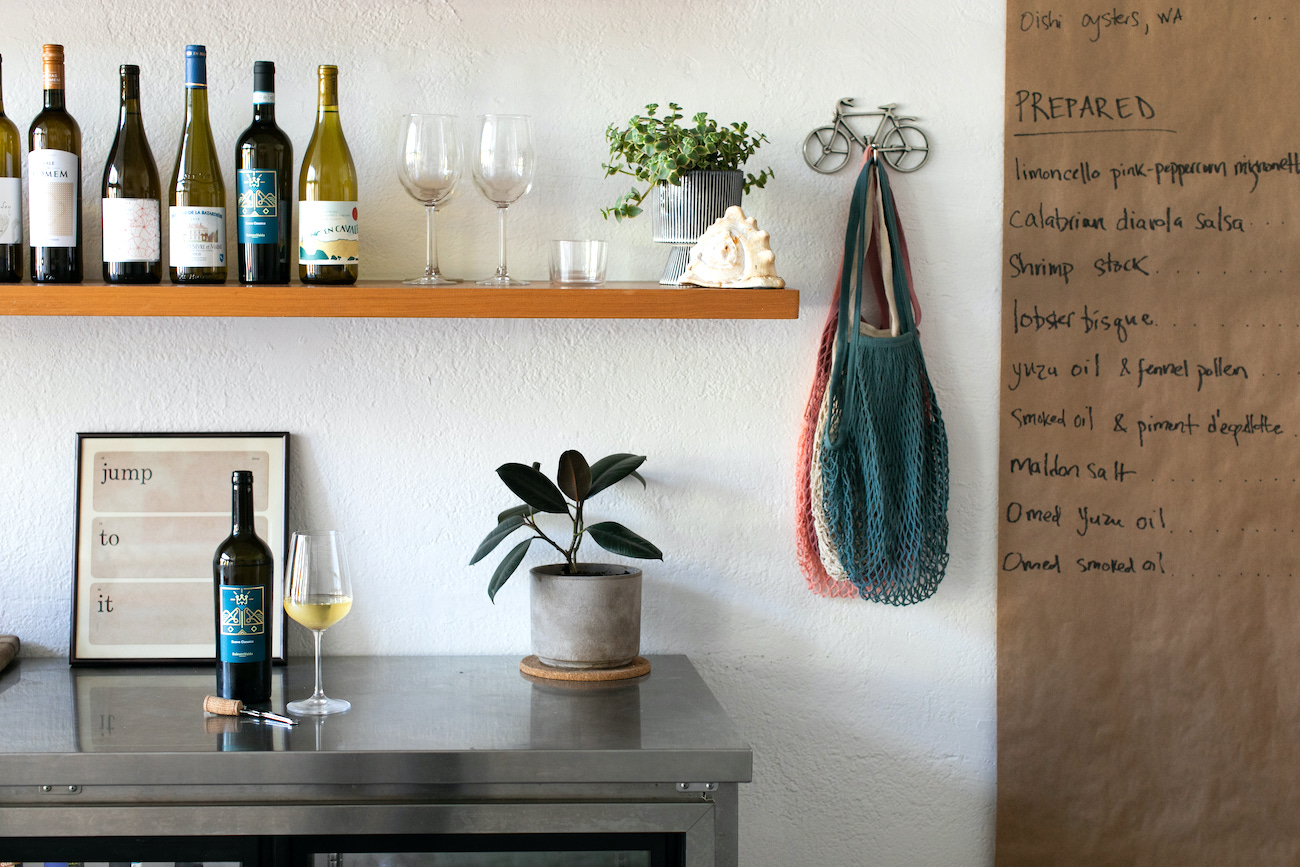
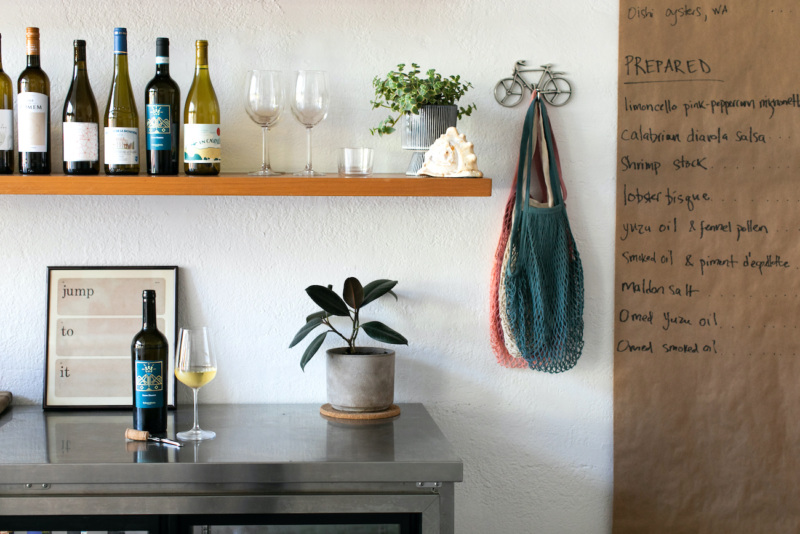
Looking at how restaurants survived, and what new businesses have launched through the pandemic, it’s similar to what happened during and after the recession in 2008. There was a big shift in how people could dine out, what was served.
Bornemann: Yeah. You had Ludo doing his pop ups, and then Kogi and food trucks. I really looked back at that time. Obviously one big difference is it was a recession and not a pandemic, so you could still have lines of people outside for a food truck, you could still have a crowded bar. We had a totally different set of circumstances. So we needed a different type of logistical solution. Fortunately, Crudo e Nudo provided that for us.
Did you always envision this focus on seafood?
Bornemann: I’ve always been interested in it. In the past, I was getting everything directly from Japan because it’s all so mind-blowing in quality, but the carbon footprint is so much larger. So I wanted to stay closer to home, work with people who have good practices here, where it’s literally one set of hands from the water to you. And because I’m receiving this directly from fishermen, the practices we use in the shop, like dry-aging to preserve the fish and increase flavor and texture, the way you would dry-age beef, we’re not fighting the game of how quickly you have to move through product.
Also, when you’re working for someone else, there are expectations of what should be on a menu. You can’t always take underutilized things, like whelks from Santa Barbara or thornyheads, because you’d have to have branzino, which people are more familiar with. Having our own place gives us the platform to highlight not just great products, but what close partnerships can do.
What are some of those things we’ll find in the market, and on the menu?
Bornemann: Our uni and shellfish will be as fresh as possible. When it comes to fin fish, we’ll be getting fish that has never been rinsed with tap water, never been scaled. Basically, it will be harvested from waters from Baja to Monterey, and I’ll get them whole. I can dry-age them, which actually makes the fish better, more flavorful, and less wasteful. The only things we’re getting from outside the area are things like shellfish from Maine.
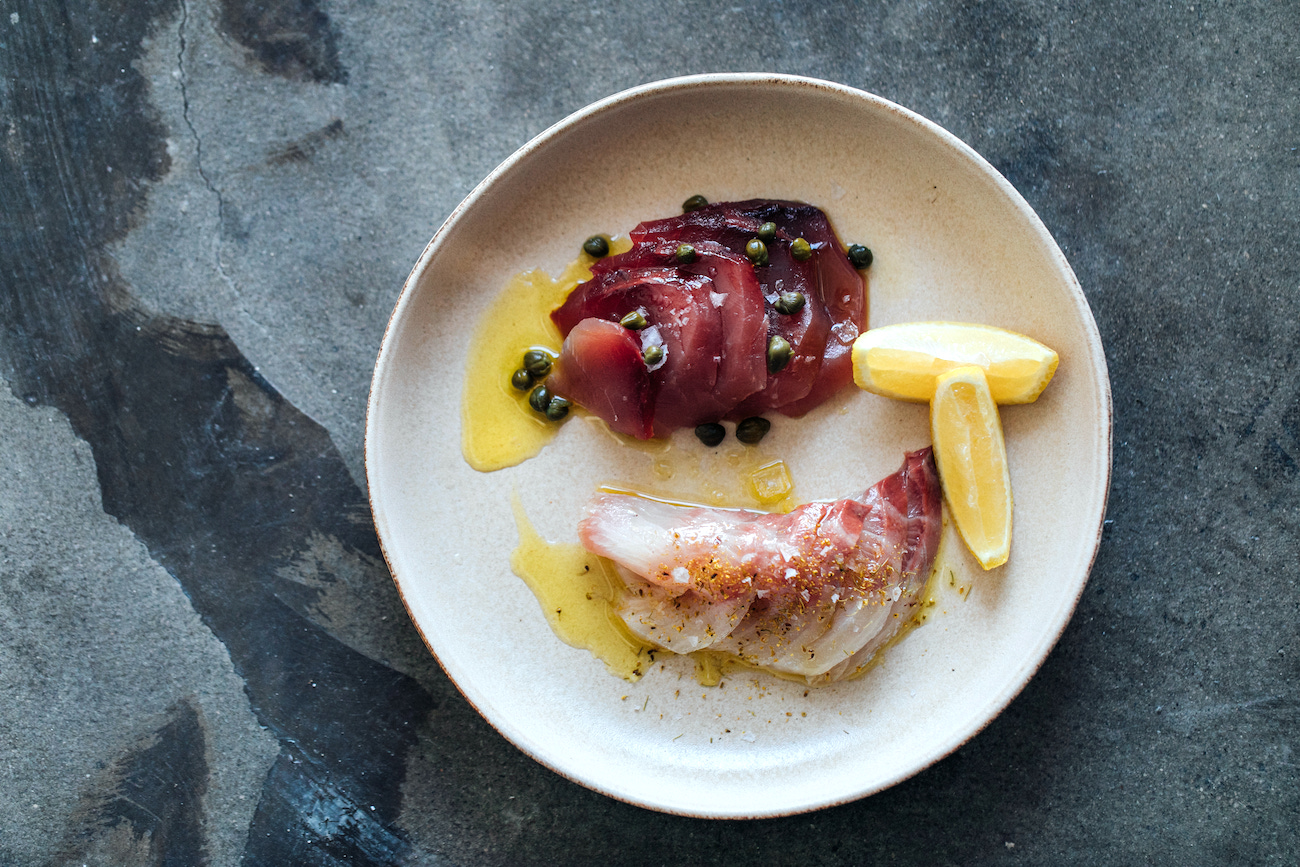
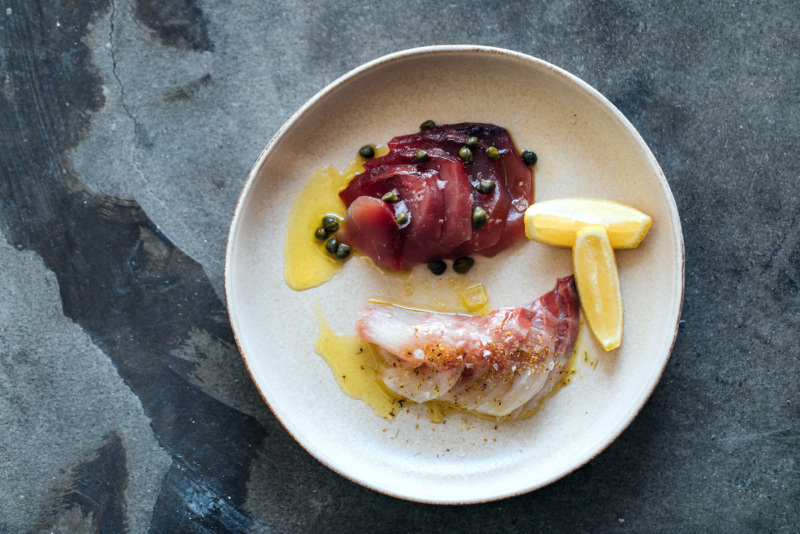
With all outdoor seating, at least for now, it definitely seems fitting for this neighborhood, but also a draw for people from all over town.
Bornemann: Before the pandemic, this location wouldn’t have been attractive to us. But there are talks of making this a pedestrian-only street a few days a week. The rent is affordable enough that we could utilize it as a market and restaurant, and have outdoor seating. We sell wines that we love and believe in, tinned seafood, olive oils, coffee that’s roasted by our friends at Blacklight Coffee, local herbs. You order at the counter and sit outside on sunny Main Street.
Doing a hybrid model does seem like a smart way to move out of the pandemic.
Bornemann: We can finally make decisions that, if we suggested them before 2020, people would’ve thought we were crazy. It’s definitely not a traditional model. We’re doing this without a pre-opening staff and traditional investors. We wanted to avoid the pitfalls of raising $2 million, and having to pay it back two to three years later. We chose this space because the footprint is small, and it doesn’t require a lot of people to maintain it.
You can totally build your own ideas about hospitality into something like this. Is opening now, as we move out of pandemic, almost like having a clean slate?
Bornemann: The clean slate is us saying we don’t have to do it that way. We don’t have to have separate dishwashers and busyboys who are only making so much an hour. We don’t have to have traditional tipping systems. The way forward for us at Crudo will be every restaurant employee takes turns doing the dishes, or running food, or shucking oysters or pouring wine. By doing that we’re able to not just create a better labor model for the restaurant, but also to create a better sense of equity in pay, in how people are treated, and understanding each other’s roles. If we share all of the duties with our employees, they’re going to feel a lot more tied to the success of the restaurant rather than just clocking in and out.
Staffing and hiring are huge issues right now. You have to find a new way to attract employees, right?
Bornemann: Leena and I got this off the ground by being our own designers, general contractors, prep cooks, dishwashers, and cleaning crew. So the way we’re moving forward will be to employ people who are treated as equal humans and understand the scope of work. There’s a lot of optimization of labor that happens in the Escoffier-style brigade system, or the Henry Ford-style assembly line. You lose a lot of connection to people as human beings that way.
A big thing I had a problem with in our industry was that you had these cooks or chefs that would believe in your concept for only so long until they burn out. And then they’d just hop to the next job for a dollar more an hour, just for something else to believe in. I think that to really get people truly excited is to feel valued and appreciated monetarily and psychologically. It will lead to a lot less churn. The turnover rate in L.A. has always been ridiculous. You don’t get a chance to grow or grow with a business. We’re hoping to change that.
What else do you hope to see for the restaurant industry going forward?
Bornemann: I hope that more impassioned people who are good operators and good at their craft, whether it’s chefs, sommeliers, or managers, are able to break free from the need for large investors who dictate how money is spent and what that restaurant can be. You don’t have to follow these traditional steps. If we have more people doing specific menu projects that are close to their hearts, I think that will invent a new way forward. And not get burned out trying to make someone else their money back.
Culhane: I’m excited about the community outreach. When we speak about environmentalism, I’m excited about the educational portion of what we’re doing. Brian and I are trying to give back through the opportunities we’ve been offered. I want all the coffee profits to go to organizations that we love. We want to lift the spirits of our community. We’re grateful for the help and education that we have, and we want to move that forward that best way we can.
Bornemann: We want to build the community, give back, as free of investment that allows us to choose to spend as we want.
Culhane: It’s the hard part, but it’s the part that will reap the greatest reward for us.
It’s ambitious, but after a year of loss, social and political upheaval, this is a good time to be a bit idealistic, isn’t it?
Culhane: Yes, exactly. I love that.
Bronemann: Yeah, we’re just going to swing for the fences here. We had a conversation this morning about sticking to our guns morally, and letting our life be the art, and how important that is right now. We’re trying to design this space and business model to be profitable and uplifting, even in the hardest of times. We’re just going to do what we know how to do.
This interview has been lightly edited for clarity and space.
Crudo e Nudo currently opens Wednesday through Sunday for marketplace retail, pickup, takeout, and patio dining. Keep an eye out for info and menu changes here.


